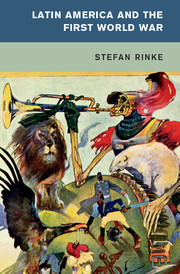Refine search
Actions for selected content:
15418 results in Military history
Chapter 2 - War across the world
- from Part 1 - Turning points
-
-
- Book:
- Kokoda
- Published online:
- 12 September 2017
- Print publication:
- 27 March 2017, pp 24-47
-
- Chapter
- Export citation
Chapter 5 - Victory at all costs
- from Part 2 - Allied perspectives
-
-
- Book:
- Kokoda
- Published online:
- 12 September 2017
- Print publication:
- 27 March 2017, pp 92-111
-
- Chapter
- Export citation
Notes
-
- Book:
- Kokoda
- Published online:
- 12 September 2017
- Print publication:
- 27 March 2017, pp 306-341
-
- Chapter
- Export citation
Chapter 16 - Kokoda
- from Part 5 - Legacies
-
-
- Book:
- Kokoda
- Published online:
- 12 September 2017
- Print publication:
- 27 March 2017, pp 288-305
-
- Chapter
- Export citation
Photographs
-
- Book:
- Kokoda
- Published online:
- 12 September 2017
- Print publication:
- 27 March 2017, pp viii-ix
-
- Chapter
- Export citation
Chapter 9 - Grinding out a victory
- from Part 2 - Allied perspectives
-
-
- Book:
- Kokoda
- Published online:
- 12 September 2017
- Print publication:
- 27 March 2017, pp 164-186
-
- Chapter
- Export citation
Part 5 - Legacies
-
- Book:
- Kokoda
- Published online:
- 12 September 2017
- Print publication:
- 27 March 2017, pp 265-305
-
- Chapter
- Export citation
Chapter 11 - Japanese commanders in Kokoda
- from Part 3 - Japanese perspectives
-
-
- Book:
- Kokoda
- Published online:
- 12 September 2017
- Print publication:
- 27 March 2017, pp 206-221
-
- Chapter
- Export citation
Part 2 - Allied perspectives
-
- Book:
- Kokoda
- Published online:
- 12 September 2017
- Print publication:
- 27 March 2017, pp 91-186
-
- Chapter
- Export citation
Chapter 10 - Making Japanese soldiers
- from Part 3 - Japanese perspectives
-
-
- Book:
- Kokoda
- Published online:
- 12 September 2017
- Print publication:
- 27 March 2017, pp 188-205
-
- Chapter
- Export citation
Map
-
- Book:
- Kokoda
- Published online:
- 12 September 2017
- Print publication:
- 27 March 2017, pp -
-
- Chapter
- Export citation
Chapter 12 - Against overwhelming odds?
- from Part 3 - Japanese perspectives
-
-
- Book:
- Kokoda
- Published online:
- 12 September 2017
- Print publication:
- 27 March 2017, pp 222-236
-
- Chapter
- Export citation
Chapter 6 - Command failures on the Kokoda Trail
- from Part 2 - Allied perspectives
-
-
- Book:
- Kokoda
- Published online:
- 12 September 2017
- Print publication:
- 27 March 2017, pp 112-131
-
- Chapter
- Export citation
Contents
-
- Book:
- Kokoda
- Published online:
- 12 September 2017
- Print publication:
- 27 March 2017, pp v-vi
-
- Chapter
- Export citation
Part 3 - Japanese perspectives
-
- Book:
- Kokoda
- Published online:
- 12 September 2017
- Print publication:
- 27 March 2017, pp 187-236
-
- Chapter
- Export citation

Latin America and the First World War
-
- Published online:
- 09 March 2017
- Print publication:
- 09 February 2017
7 - Japan betwixt Maritime and Continental World Orders
-
- Book:
- The Japanese Empire
- Published online:
- 31 March 2017
- Print publication:
- 06 March 2017, pp 178-188
-
- Chapter
- Export citation
5 - The Second Sino- Japanese War (1931– 1941)
-
- Book:
- The Japanese Empire
- Published online:
- 31 March 2017
- Print publication:
- 06 March 2017, pp 109-142
-
- Chapter
- Export citation
6 - The General Asian War (1941– 1945)
-
- Book:
- The Japanese Empire
- Published online:
- 31 March 2017
- Print publication:
- 06 March 2017, pp 143-177
-
- Chapter
- Export citation
Maps
-
- Book:
- The Japanese Empire
- Published online:
- 31 March 2017
- Print publication:
- 06 March 2017, pp xii-xii
-
- Chapter
- Export citation
